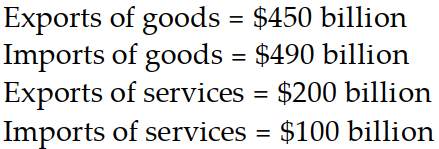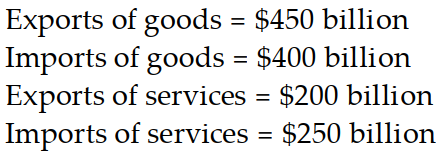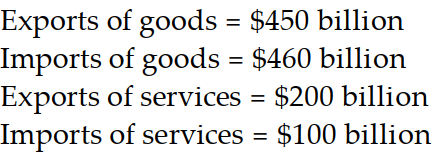Deck 25: Macroeconomics in an Open Economy
Question
Question
Question
Question
Question
Question
Question
Question
Question
Question
Question
Question
Question
Question
Question

Unlock Deck
Sign up to unlock the cards in this deck!
Unlock Deck
Unlock Deck
1/15
Play
Full screen (f)
Deck 25: Macroeconomics in an Open Economy
1
Current trade between China and Egypt is such that
A) China has placed high tariffs on the imports of Egyptian products.
B) China can easily purchase domestic Egyptian firms.
C) China has a low level of net foreign investment.
D) Egyptian imports from China greatly exceed exports to China.
A) China has placed high tariffs on the imports of Egyptian products.
B) China can easily purchase domestic Egyptian firms.
C) China has a low level of net foreign investment.
D) Egyptian imports from China greatly exceed exports to China.
Egyptian imports from China greatly exceed exports to China.
2
China has large holdings of U.S. Treasury bonds. Suppose China decide to sell the majority of these bonds. If an American was thinking of refinancing their house, how would China's action affect their decision to refinance?
A) The person would want to wait to refinance as interest rates should fall.
B) The person would want to wait to refinance as interest rates should rise.
C) China's actions should not affect the decision to refinance in any way.
D) The person would want to refinance as soon as possible as interest rates should fall.
A) The person would want to wait to refinance as interest rates should fall.
B) The person would want to wait to refinance as interest rates should rise.
C) China's actions should not affect the decision to refinance in any way.
D) The person would want to refinance as soon as possible as interest rates should fall.
The person would want to wait to refinance as interest rates should rise.
3
Which of the following transactions would be included in Japan's current account?
A) an American citizen purchases a new Toyota made in Japan
B) a Japanese citizen purchases 50 shares of Google stock
C) an American citizen purchases 50 shares of Toshiba stock
D) a Japanese citizen purchases a new Toyota made in Japan
A) an American citizen purchases a new Toyota made in Japan
B) a Japanese citizen purchases 50 shares of Google stock
C) an American citizen purchases 50 shares of Toshiba stock
D) a Japanese citizen purchases a new Toyota made in Japan
an American citizen purchases a new Toyota made in Japan
4
Which of the following is not included in the financial account balance of Saudi Arabia?
A) a purchase of General Electric stock by a Saudi firm in China
B) a purchase of German financial services by Riyadh bank
C) a purchase of a German car by a Saudi company.
D) a purchase of Toyota stock by Saudi Aramco
E) a purchase of a Saudi petrochemical plant by Japanese investors.
A) a purchase of General Electric stock by a Saudi firm in China
B) a purchase of German financial services by Riyadh bank
C) a purchase of a German car by a Saudi company.
D) a purchase of Toyota stock by Saudi Aramco
E) a purchase of a Saudi petrochemical plant by Japanese investors.

Unlock Deck
Unlock for access to all 15 flashcards in this deck.
Unlock Deck
k this deck
5
Suppose the majority of the shares of the U.S. General Motors stock were sold to a Japanese firm. Assuming all else remains constant, this will
A) decrease net portfolio investment in the U.S.
B) create a capital outflow.
C) increase the balance on the U.S. current account.
D) increase foreign direct investment in the U.S.
E) increase the balance of the financial account.
A) decrease net portfolio investment in the U.S.
B) create a capital outflow.
C) increase the balance on the U.S. current account.
D) increase foreign direct investment in the U.S.
E) increase the balance of the financial account.

Unlock Deck
Unlock for access to all 15 flashcards in this deck.
Unlock Deck
k this deck
6
Which of the following would result in a trade surplus for Qatar?
A)
B)
C)
D)
A)

B)

C)

D)


Unlock Deck
Unlock for access to all 15 flashcards in this deck.
Unlock Deck
k this deck
7
If there is currently a surplus of dollars, which of the following would you expect to see in the foreign exchange market?
A) There will be a decrease in the demand for dollars.
B) The dollar will depreciate.
C) The dollar will appreciate.
D) There will be a decrease in the supply of dollars.
A) There will be a decrease in the demand for dollars.
B) The dollar will depreciate.
C) The dollar will appreciate.
D) There will be a decrease in the supply of dollars.

Unlock Deck
Unlock for access to all 15 flashcards in this deck.
Unlock Deck
k this deck
8
Between early 2002 and summer 2008 the value of the dollar
A) lost about 45 percent of its value against the euro.
B) increased about 50 percent against an average of other major currencies.
C) declined against other major currencies because of strong demand by foreign investors for U.S. stocks and bonds.
D) declined against some foreign currencies, rose against others and overall had about the same value against an average of other major currencies.
A) lost about 45 percent of its value against the euro.
B) increased about 50 percent against an average of other major currencies.
C) declined against other major currencies because of strong demand by foreign investors for U.S. stocks and bonds.
D) declined against some foreign currencies, rose against others and overall had about the same value against an average of other major currencies.

Unlock Deck
Unlock for access to all 15 flashcards in this deck.
Unlock Deck
k this deck
9
Hugo Chavez, Venezuela's president, proposed that the independence of the Venezuelan central bank be eliminated. Given the research on the relationship between central bank independence and inflation, we should expect this event to cause inflation to ________ and the real exchange rate to ________ between the two counties. (Assume the nominal exchange does not change, and that the United States is the domestic country).
A) rise in Venezuela relative to the U.S.; fall
B) rise in Venezuela relative to the U.S.; rise
C) fall in Venezuela relative to the U.S.; rise
D) fall in Venezuela relative to the U.S.; fall
A) rise in Venezuela relative to the U.S.; fall
B) rise in Venezuela relative to the U.S.; rise
C) fall in Venezuela relative to the U.S.; rise
D) fall in Venezuela relative to the U.S.; fall

Unlock Deck
Unlock for access to all 15 flashcards in this deck.
Unlock Deck
k this deck
10
If the Oman is a "net borrower" from abroad,
A) net capital flows must be negative.
B) net foreign investment must be positive.
C) the Oman must be exporting more than it is importing.
D) domestic saving is less than domestic investment.
A) net capital flows must be negative.
B) net foreign investment must be positive.
C) the Oman must be exporting more than it is importing.
D) domestic saving is less than domestic investment.

Unlock Deck
Unlock for access to all 15 flashcards in this deck.
Unlock Deck
k this deck
11
In theory, what should the rising U.S. current account deficit do the value of the dollar?
A) It should decrease the supply of dollars and increase the foreign exchange rate of the dollar.
B) It should increase the supply of dollars, and decrease the foreign exchange rate of dollars.
C) It should decrease the supply of dollars and decrease the foreign exchange rate of the dollar.
D) If should increase the supply of dollars and increase the foreign exchange rate of dollars.
A) It should decrease the supply of dollars and increase the foreign exchange rate of the dollar.
B) It should increase the supply of dollars, and decrease the foreign exchange rate of dollars.
C) It should decrease the supply of dollars and decrease the foreign exchange rate of the dollar.
D) If should increase the supply of dollars and increase the foreign exchange rate of dollars.

Unlock Deck
Unlock for access to all 15 flashcards in this deck.
Unlock Deck
k this deck
12
Why has the large U.S. current account persisted?
A) The supply of dollars on the foreign exchange market has fallen.
B) The foreign exchange value of the dollar has not decreased.
C) Foreign investors are reluctant to invest in U.S. real and financial assets.
D) Foreign investors have refused to hold large quantities of dollars.
A) The supply of dollars on the foreign exchange market has fallen.
B) The foreign exchange value of the dollar has not decreased.
C) Foreign investors are reluctant to invest in U.S. real and financial assets.
D) Foreign investors have refused to hold large quantities of dollars.

Unlock Deck
Unlock for access to all 15 flashcards in this deck.
Unlock Deck
k this deck
13
Why has the dollar remained strong and its value not decreased as much as economists expected given the current account deficit?
A) Foreign investors continue to invest in U.S. financial assets, and this raises the demand for dollars.
B) Foreign investors have reduced the level of investment in U.S. financial assets, increasing the supply of dollars.
C) Foreign investors no longer want to hold dollars and this raises the demand for dollars.
D) The negative trade balance due to the current account deficit reduces the supply of dollars.
A) Foreign investors continue to invest in U.S. financial assets, and this raises the demand for dollars.
B) Foreign investors have reduced the level of investment in U.S. financial assets, increasing the supply of dollars.
C) Foreign investors no longer want to hold dollars and this raises the demand for dollars.
D) The negative trade balance due to the current account deficit reduces the supply of dollars.

Unlock Deck
Unlock for access to all 15 flashcards in this deck.
Unlock Deck
k this deck
14
Why is the multiplier for contractionary fiscal policy smaller in an open economy?
A) Contractionary fiscal policy reduces the deficit, which reduces the interest rate, which reduces the foreign exchange value of the dollar, which decreases net exports.
B) Contractionary fiscal policy reduces the deficit, which raises the interest rate, which raises the foreign exchange value of the dollar, which increases net exports.
C) Contractionary fiscal policy increases the deficit, which raises the interest rate, which reduces the foreign exchange value of the dollar, which increases net exports.
D) Contractionary fiscal policy reduces the deficit, which reduces the interest rate, which reduces the foreign exchange value of the dollar, which increases net exports.
A) Contractionary fiscal policy reduces the deficit, which reduces the interest rate, which reduces the foreign exchange value of the dollar, which decreases net exports.
B) Contractionary fiscal policy reduces the deficit, which raises the interest rate, which raises the foreign exchange value of the dollar, which increases net exports.
C) Contractionary fiscal policy increases the deficit, which raises the interest rate, which reduces the foreign exchange value of the dollar, which increases net exports.
D) Contractionary fiscal policy reduces the deficit, which reduces the interest rate, which reduces the foreign exchange value of the dollar, which increases net exports.

Unlock Deck
Unlock for access to all 15 flashcards in this deck.
Unlock Deck
k this deck
15
If the U.S. Federal reserve bank is using policy to combat inflation, what is likely to happen in the foreign exchange market and to the foreign exchange value of the dollar?
A) The demand for the dollar will increase and the foreign exchange value of the dollar will rise.
B) The demand for the dollar will decrease and the foreign exchange value of the dollar will rise.
C) The demand for the dollar will decrease and the foreign exchange value of the dollar will fall.
D) The demand for the dollar will increase and the foreign exchange value of the dollar will fall.
A) The demand for the dollar will increase and the foreign exchange value of the dollar will rise.
B) The demand for the dollar will decrease and the foreign exchange value of the dollar will rise.
C) The demand for the dollar will decrease and the foreign exchange value of the dollar will fall.
D) The demand for the dollar will increase and the foreign exchange value of the dollar will fall.

Unlock Deck
Unlock for access to all 15 flashcards in this deck.
Unlock Deck
k this deck


